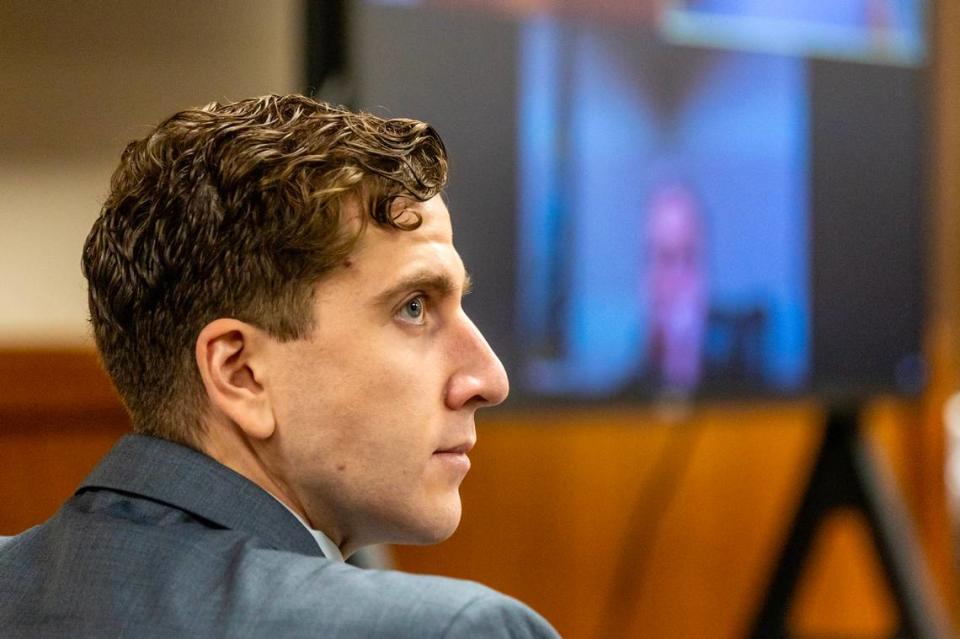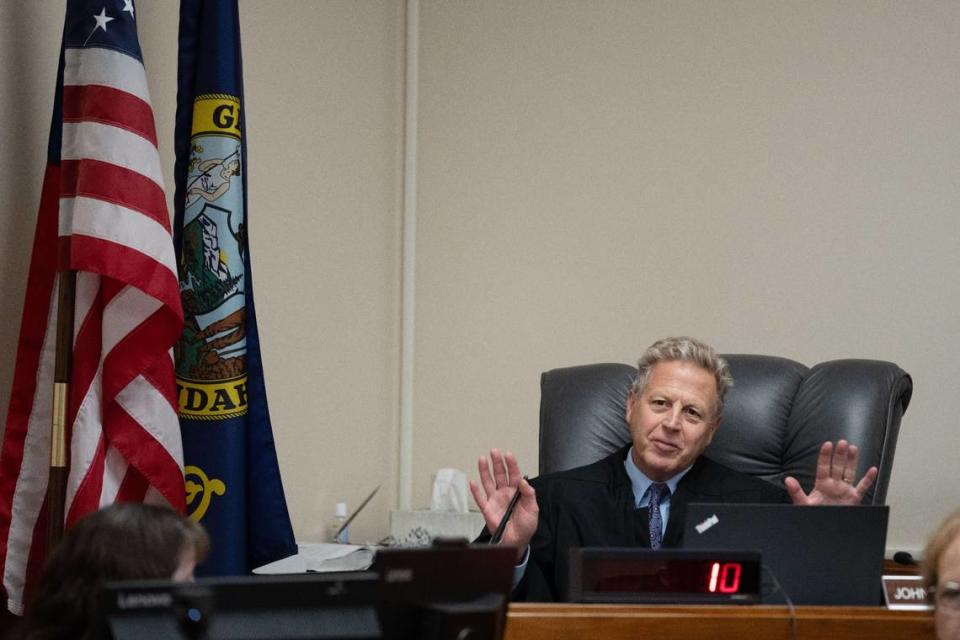Attorneys in Idaho student murder case signal trial may not begin until next year
The trial of Bryan Kohberger, the man accused of killing four University of Idaho students, is unlikely to start for at least another year, with attorneys on both sides of the high-profile capital murder case targeting summer 2025.
Judge John Judge of Idaho’s 2nd Judicial District on Friday denied the defense’s request that he reconsider his prior ruling to uphold the grand jury indictment and emphasized his goal of moving the case to trial. Judge held off from setting an updated schedule, including a trial date, while also acknowledging the court needed to conduct the legal process properly to avoid potential mistakes that could lead to future appeals.
“I’d really like to do this sooner than later,” Judge said at the pretrial hearing Friday. “I’m not going to just let it hang for too long, but it’s really hard for me right now to set something in 2025, even though that might be the reality, and I know that there’s lots of other issues to be addressed.”
Latah County Prosecutor Bill Thompson said the state could be prepared for trial as soon as this summer. He stated the prosecution’s preference for a time of year for the case to proceed while students at the U of I, nearby Washington State University and Moscow public schools are out of session.
Anne Taylor, Kohberger’s lead public defender, meanwhile said a summer 2024 trial would be “impossible” for the defense to effectively represent its client. Volumes of evidence, expert testimony, hours of video footage, and 13,000 photographs still need to be closely reviewed, and a date at least a year from that time frame would be the soonest she could reasonably imagine for a trial — a 12- to 15-week trial at that, she said, not the previously discussed six weeks.
“I’m nervous telling you I’ll be ready by summer 2025,” Taylor told Judge on Friday, standing to the right of a seated Kohberger, who attended in a blue suit and yellow plaid tie.
The defense also intends to request a change of venue away from Latah County for the trial, ahead of a date being set, Taylor said.
The state would oppose taking the case out of Latah County, Thompson said, and believed that an appropriate jury could be selected in the community where the crime occurred.
“I don’t think it’s going to change anything, Judge, when this case has national if not international attention,” Thompson said Friday. “But we think we at least owe the people of Latah County the attempt to seat a jury here first and not just rely on, ‘There’s been a lot of publicity.’ There’s been a lot of publicity everywhere.”

Kohberger, 29, is accused of killing four U of I students at an off-campus home in Moscow in November 2022. The victims were seniors Madison Mogen and Kaylee Goncalves, both 21, junior Xana Kernodle and freshman Ethan Chapin, both 20.
Kohberger, a graduate student at WSU in Pullman, Washington, at the time, was arrested about seven weeks later in December 2022 at his parents’ eastern Pennsylvania home. He waived extradition and agreed to go to Idaho in January 2023 to face the charges.
Judge denies request to appeal indictment ruling
Friday afternoon’s hearing was the last of three hearings for the day concerning Kohberger but the only one of them open to the public. The two hearings scheduled for the morning were held behind closed doors, and Judge offered no information about what transpired at them during the public portion.
The closed sessions were held to first decide whether the previously scheduled closed hearing should be opened to the public, and second to discuss sensitive information about the grand jury indictment, which the defense requested Judge reconsider dismissing on several legal grounds. Judge ruled last month against all four of the defense’s efforts to throw out the grand jury indictment.
During the public hearing, defense attorney Jay Logsdon asked Judge to grant the defense permission to file an appeal on behalf of Kohberger with the Idaho Supreme Court. He again argued the legal threshold in the state for a grand jury to indict a defendant should be based on the higher standard of beyond on a reasonable doubt — the same as at trial — instead of the lower standard of probable cause.
“Whether or not there’s a valid indictment in this case is going to decide whether or not he sits here and whether or not a trial should occur,” Logsdon said. “This isn’t our attempt to achieve some delay. This is our attempt to make sure that our client is getting due process at every step in this case and that … no stone (is) left unturned.”
Idaho Deputy Attorney General Jeff Nye argued to oppose the prosecution’s request. Judge agreed with Nye that such an appeal threatened to further delay an already lengthy legal process that could still be more than a year away from going to trial. He added that he did not err in his prior ruling and would not change his mind now.

“That decision was put out quite a while ago, it’s rooted in well-settled law and I think it was correct,” Judge said. “If I deny it, the Supreme Court can still pick up the appeal. That’s up to them. But they do look at what the district judge’s opinion (was) and that may have some bearing on that. I hope so.”
Kohberger lockup passes one-year mark
On hand Friday were Kaylee Goncalves’s parents, Steve and Kristi Goncalves, their attorney Shanon Gray, and other members of their family. Judge said he recognized the impact of pushing out the murder trial — especially for the victims’ family members — but he aims to put on a trial only once.
“It’s demoralizing to think that we have to have a case so far in the future, but if that’s what is the right thing for everybody to do it correctly, maybe we only have to do it one time,” he said. “So my heart goes out to the victims. I can’t even imagine the pain, the grief because you can’t really go forward with your life with this hanging over your head. So, sorry.”
After the hearing, the Goncalveses posted to a Facebook page with 61,000 followers and managed by the family related to the death of their daughter: “We have no words,” adding a crying emoji, and “#GoncalvesArmyofLove #JusticeSomeday.”
Friday’s hearing was the first streamed live online after Judge removed all cameras controlled by the media from the courtroom. At its peak, more than 6,300 people tuned into the nearly one-hour hearing.
Kohberger has remained at the Latah County Jail in the basement beneath the courthouse in Moscow since he was brought to Idaho, which passed the one-year mark earlier this month. Prosecutors seated a grand jury in the case, which indicted Kohberger on four charges of first-degree murder and one count of felony burglary in May.
Kohberger was arraigned and stood silent when asked for his plea on each of the five charges. Judge in turn entered a not guilty plea on Kohberger’s behalf.
Kohberger’s trial date was postponed after he waived his right to a speedy trial, which granted his publicly provided attorneys time to build his defense. Prosecutors plan to seek the death penalty for Kohberger if a jury finds him guilty at trial.
Thompson took umbrage Friday with defense attorney Logsdon’s assertion at the hearing that “the state’s decided that it wants to try to kill someone” by seeking a trial on an expedited timeline and in pursuing the death penalty.
“Frankly, I find that offensive,” Thompson said. “We are simply trying to fulfill our responsibilities under the law. To characterize it as, ‘The state is trying to kill someone,’ it’s just simply appealing to raw emotion and it has no place in this courtroom.”


